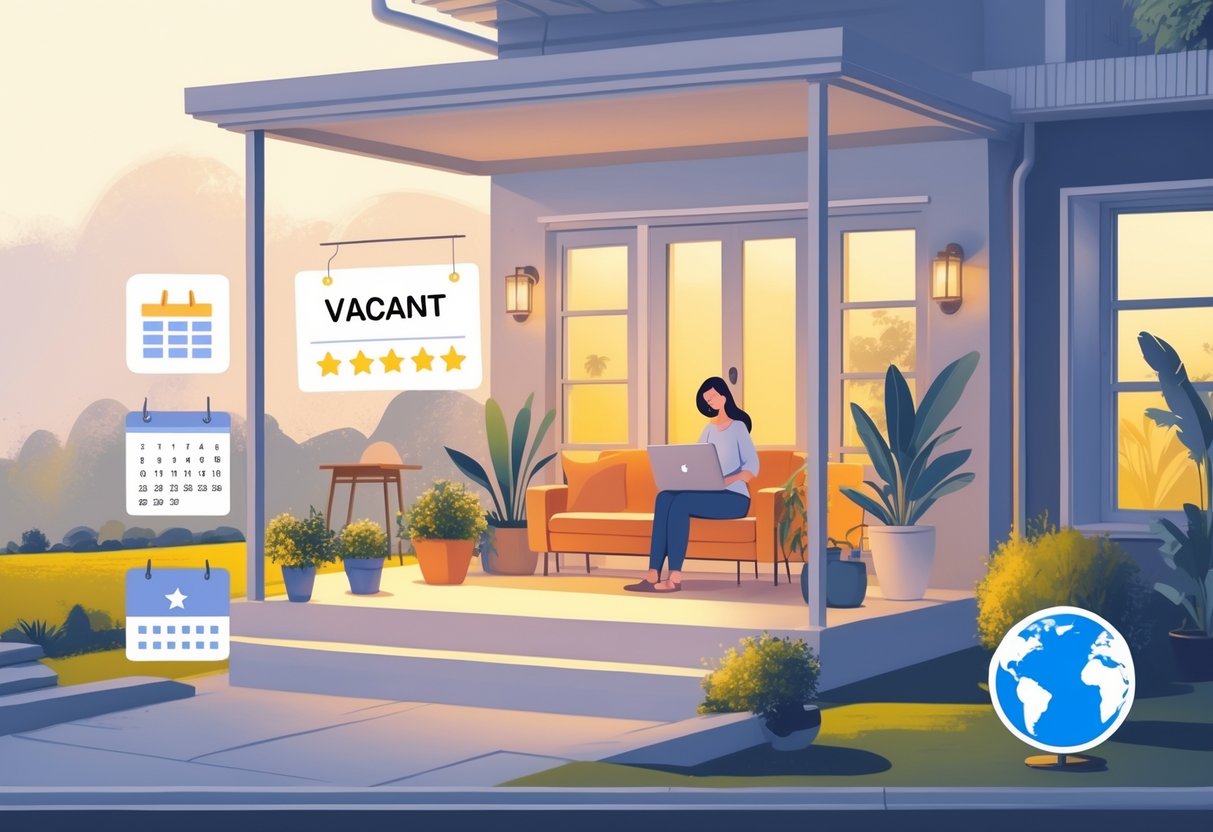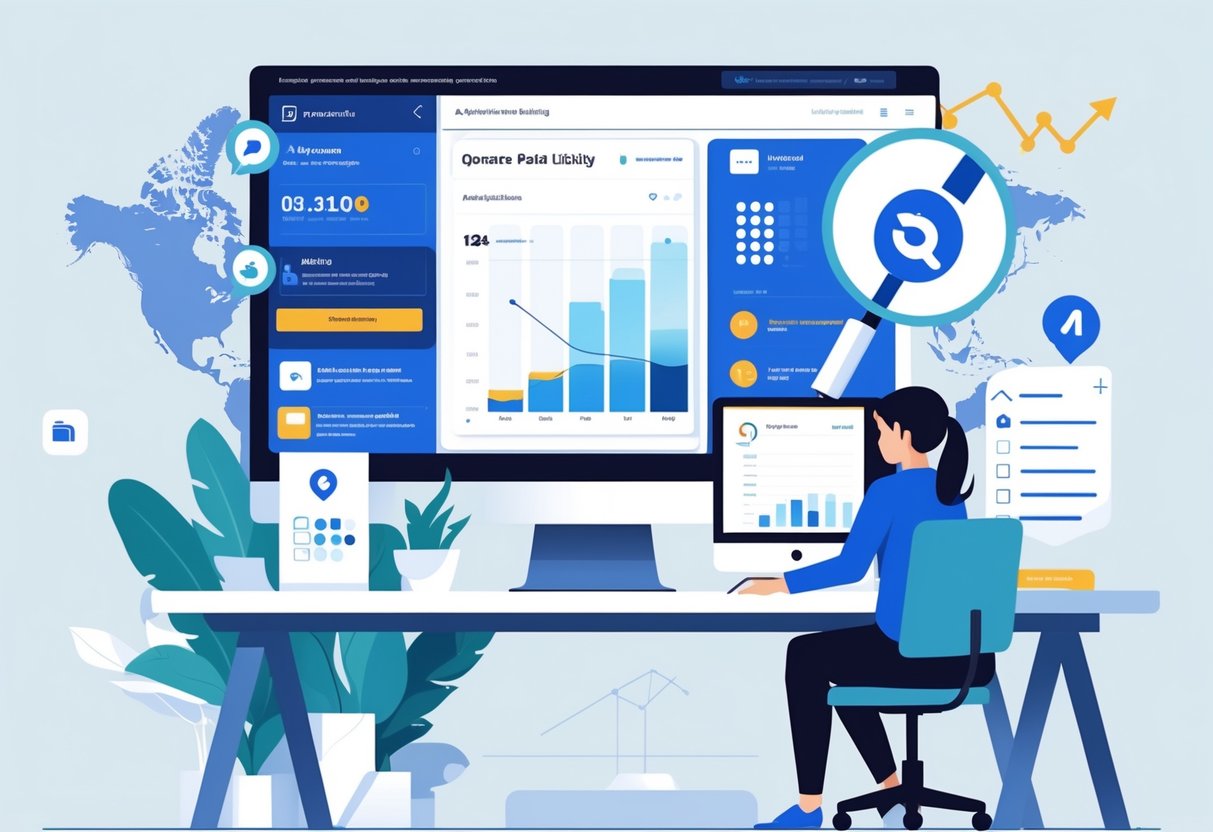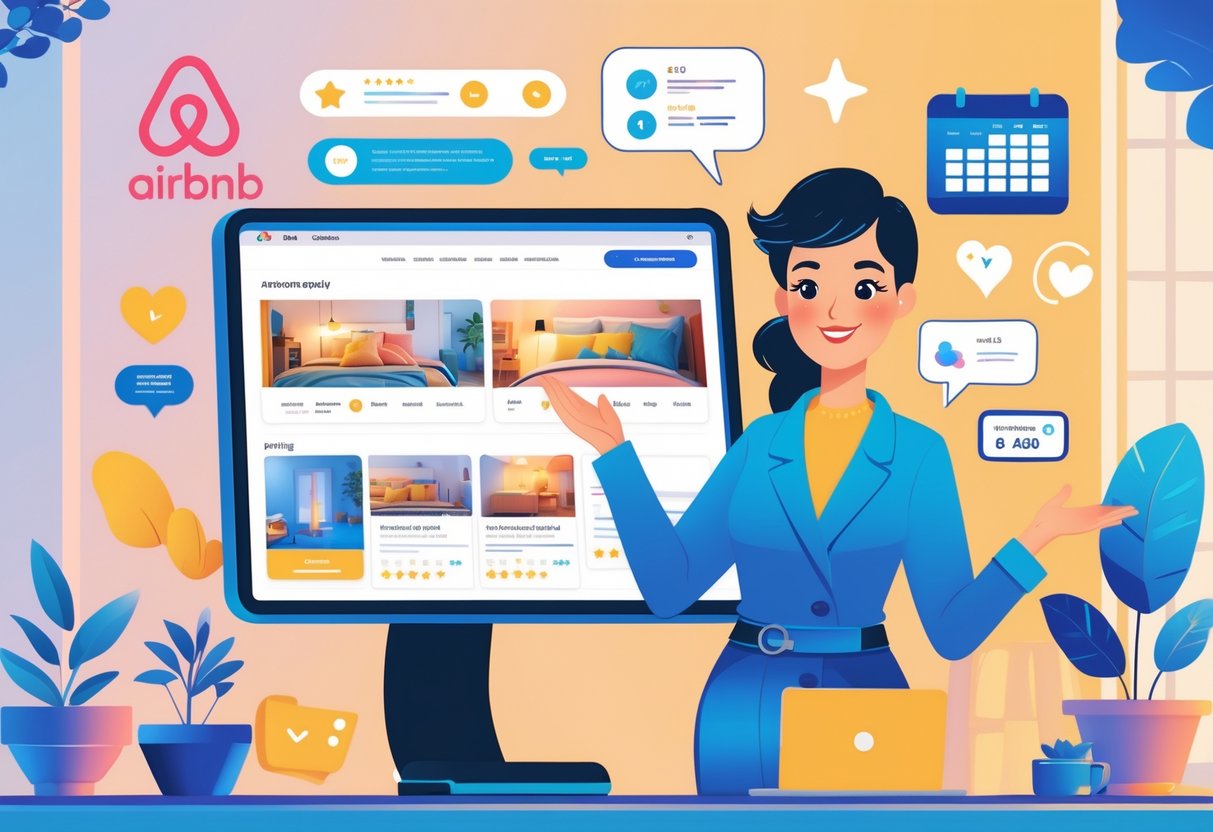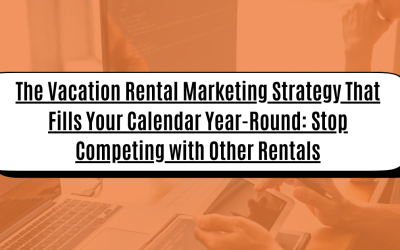Getting more bookings for your Airbnb isn’t just about tossing up a listing and hoping for the best. With millions of properties out there, you really have to hustle to get noticed.

The most effective way to promote your Airbnb is honestly a multi-channel approach. You need to optimize your listing, sure, but you also have to get creative with marketing—on and off the platform.
That means killer photos, great descriptions, and leaning into social media, smart pricing, and guest experience to drive more bookings. The basics matter, but so does building a reputation with guests who rave about their stay.
The best strategies make your property pop in search results, speak to your ideal guests, and keep standards high enough that people want to come back—or tell their friends.
Key Takeaways
- Use professional photos, detailed descriptions, and smart pricing to bump up your search visibility.
- Promote your place beyond Airbnb—think social media, custom URLs, and teaming up with local businesses.
- Focus on guest satisfaction and fast replies to earn five-star reviews and maybe even Superhost status.
Optimizing Your Airbnb Listing for Maximum Visibility

Optimizing your Airbnb listing means focusing on three things: photos, titles, and what makes your place unique. These are the levers that really move your ranking and booking rates.
Professional photos, punchy titles, and clear unique selling points can make your property shine even in a sea of options.
Crafting Compelling Listing Titles and Descriptions
Your title is your first handshake with potential guests. You only get 50 characters, so make them count—location, property type, and standout amenities are your best bets.
Effective titles include:
- Neighborhood names
- Property style (loft, cottage, villa)
- Key amenities (pool, downtown, waterfront)
- Guest capacity, if that’s a selling point
The description should speak to the kind of trip your guest wants. Great listings answer questions about what makes a stay special and how your place delivers.
Address common concerns right up front—parking, check-in, accessibility. Use clear, direct language.
Highlight local attractions and experiences. Give people a reason to pick your place instead of the one next door.
Showcasing High-Quality Photos
Photos are everything. If you want people to stop scrolling, your cover photo has to pop.
Key photo must-haves:
- Bright, well-lit spaces
- Clean, uncluttered rooms
- Multiple angles for each area
- Outdoor spaces and amenities
- Shots of the local area
Don’t just show the same pool or kitchen as everyone else—find details that set your place apart.
Each room deserves a few honest photos. Avoid misleading images; unhappy guests leave bad reviews, and that stings.
If you can, add a walkthrough video. Sometimes, video just connects in a way photos can’t.
Highlighting Unique Selling Points
Every Airbnb needs a hook—something that makes it stand out. Figure out what’s special about your place and show it off everywhere.
Common unique selling points:
- Killer views or prime locations
- Special amenities (hot tub, game room, chef’s kitchen)
- Cool architecture or design
- Close to popular spots
- Family-friendly or pet-friendly policies
Make these features obvious in your photos and descriptions. Guests should know right away why your place is the better choice.
Check out your competition. If everyone’s bragging about a pool, maybe your private garden or rooftop terrace is what people really want.
Accessibility features like step-free entry or grab bars can also set you apart. Include these details in both words and photos.
Enhancing Your Airbnb Host Profile

A complete host profile—good photos, thorough descriptions—builds guest trust. Credentials like Superhost status give you an edge.
Building Trust With a Complete Profile
Your profile photo matters. Make it friendly and well-lit, and if you want to look extra approachable, include your family or pet. Guests notice.
Tell your story in the description. Let guests know what makes you tick, why you love hosting, and what you know about the area.
Fill out every section. Empty boxes make you look careless.
Key profile elements:
- Professional headshot
- Hosting experience
- Local expertise
- Personal interests and hobbies
- How quickly you reply
Leveraging Host Credentials for Credibility
Superhost status is gold. That badge tells guests you’re reliable and, honestly, you’ll probably get more bookings.
To get it, you need high ratings, fast replies, and low cancellations. You also have to host at least 10 stays a year.
Other credentials help too—ID verification, professional host status, even how many years you’ve been doing this. These badges show up on your profile and boost confidence.
Credentials to highlight:
- Superhost badge
- Identity verified
- Professional host
- Years hosting
Show off your response rate and how fast you reply. Guests notice.
Pricing Strategies That Attract More Bookings
Smart pricing tools can tweak your rates automatically. Last-minute discounts help fill those awkward gaps in your calendar.
Utilizing Smart Pricing Tools
Dynamic pricing tools scan the market and set your rates based on demand, local events, and what your competition’s doing. They pretty much take the guesswork out of pricing.
Automated pricing can bump bookings by up to 40%. These tools update rates every day based on real-time trends.
Popular features:
- Set min and max prices
- Different rates for weekends vs. weekdays
- Adjust for holidays and events
- Monitor competitor rates
Most platforms have built-in pricing tools, or you can use third-party services. These systems help you avoid underpricing during busy times and overpricing when things are slow.
Smart pricing is about finding that sweet spot between profit and steady bookings. Set boundaries that protect your bottom line.
Offering Last-Minute Discounts
Last-minute discounts can fill empty nights and keep money coming in. If your place is still open a week out, a 10-20% discount can attract spontaneous travelers.
These guests often leave good reviews and might even come back.
Discount ideas:
- Weekly deals for longer stays
- Same-day booking discounts
- Offers for single nights between reservations
- Off-season promos
Don’t go overboard with discounts—too many and your place looks cheap. Use them strategically and back them up with great guest experiences.
Automated tools can handle discounts for you, so you’re not glued to your calendar.
Maximizing Guest Satisfaction and Five-Star Reviews
Happy guests leave five-star reviews, and those reviews push your place higher in Airbnb’s rankings. Good reviews mean more bookings, plain and simple.
Providing Exceptional Guest Experiences
Focus on smooth operations and small, personal touches. Cleanliness and clear check-in instructions make a great first impression.
Before arrival, send guests directions, parking info, and access codes at least a day ahead. This cuts down on confusion and stress.
Must-have amenities:
- Fresh linens and towels
- Basic toiletries and cleaning supplies
- Reliable Wi-Fi with the password posted
- Local guides and recommendations
- Emergency contact info
Reply to guest messages fast—ideally within an hour. It shows you care.
If something goes wrong, own up to it and fix it fast. Sometimes, a quick solution (or a little compensation) can turn a bad situation into a glowing review.
Encouraging Reviews With Thoughtful Follow-Up
Timing is everything when asking for reviews. Send a follow-up within 24 hours of checkout while the stay’s still fresh in their minds.
Personalize your message. Mention something specific from their trip, or thank them for leaving the place tidy.
Ask for a review directly, but don’t be pushy. A simple, polite request works best.
Effective follow-up schedule:
- Day of checkout: Thank you note
- 24-48 hours later: Review request with a personal touch
- One week later: Final gentle reminder, if needed
Hosts who nail this usually see review rates above 70%. Not bad.
Improving Airbnb Ranking With Responsiveness
Fast replies and automated messaging help your search ranking. Quick responses build guest confidence and save you time.
Achieving Fast Response Time
Airbnb rewards hosts who reply quickly. The platform tracks your response times and uses them to decide where you show up in search.
Aim for:
- Initial inquiries: Within 1 hour
- Follow-ups: Within 30 minutes
- Booking requests: Within 15 minutes
Turn on push notifications so you never miss a message. Some hosts even get a separate phone just for Airbnb.
Don’t just reply fast—be helpful. Answer questions directly and add any extra info that might help.
Guests often browse on weekends and evenings, so stay alert during those times. Consistent, fast replies pay off.
Automating Guest Communication
Automated messaging tools can save your sanity. They handle the routine stuff so you can focus on the real guest experience.
Good automation ideas:
- Instant booking confirmations with check-in info
- Pre-arrival messages with Wi-Fi passwords and local tips
- Automated answers for common questions
Smart tools pick up on keywords and send the right reply, usually in under a minute.
Just remember to review your automated messages now and then. Keep them accurate, and sprinkle in a little personality so guests don’t feel like they’re talking to a robot.
Promoting Your Airbnb Rental Beyond Airbnb
Social media marketing lets you reach travelers where they hang out online. Local partnerships bring in unique experiences that set your place apart. Direct marketing helps you build relationships with guests—beyond the platform’s walls.
Harnessing Social Media Platforms
Social media provides visual-first marketing opportunities that let hosts showcase short-term rental properties to people actively planning trips.
Instagram is where most folks go for travel inspiration. Hosts should post high-quality photos of their Airbnb spaces and use location-based hashtags like #seattlevacation or #ashevillegetaway.
Stories and Reels usually get more engagement than regular posts. Property owners can share quick room tours, local restaurant picks, and some behind-the-scenes moments.
Facebook gives you targeted advertising options based on demographics and interests. Hosts can join local travel groups or set up business pages just for their properties.
Pinterest is surprisingly effective for destination marketing. Savvy hosts create boards with local attractions, restaurants, and fun activities alongside their rental listings.
TikTok taps into younger travelers with short, catchy videos. Property managers can use trending sounds and location tags to boost visibility among potential guests.
Each platform needs a steady posting schedule. Hosts should actually talk with followers to build real relationships—not just broadcast.
Utilizing Local Partnerships and Direct Marketing
Strategic partnerships with local businesses help short-term rentals stand out from standard hotels.
Restaurant partnerships can offer exclusive discounts to guests. Coffee shops, tour companies, and activity providers often love cross-promotional opportunities that benefit both sides.
Direct marketing tactics include:
- Email newsletters featuring property updates and local events
- QR codes in welcome books linking to booking websites
- Exclusive offers for repeat guests
- Referral programs rewarding past visitors
Local event partnerships can position Airbnb rentals as the go-to spot for festivals and conferences. Hosts might offer special packages during those high-demand times.
Working with spas, adventure companies, or cultural attractions can create memorable experiences for guests. These collaborations often bump up guest satisfaction and lead to better reviews.
Email marketing keeps you in touch with past guests, without platform restrictions. You can promote off-season discounts, announce property upgrades, and encourage repeat bookings with personalized messages.
Frequently Asked Questions
A lot of Airbnb hosts want straight answers about social media marketing, SEO, and affordable promotion. Understanding how to stand out and book more guests really helps hosts make smarter marketing choices.
How can I effectively market my Airbnb listing on social media platforms?
Hosts should create dedicated Facebook pages for their properties and join local short-term rental groups. These spaces let you interact directly with potential guests and show off your property with engaging content.
Instagram Stories are great for behind-the-scenes videos and special offers. Building a library of high-quality photos and videos helps hosts create content that actually connects with their target audience.
TikTok makes it easy to show off unique property features with simple editing tools. The best Airbnb TikToks highlight stunning locations and help viewers picture themselves staying there.
Hosts can use Instagram polls and interactive features to get more audience engagement. Sharing stories across platforms helps you reach more people—no need to reinvent the wheel for every channel.
What strategies can I use to enhance my Airbnb’s visibility on Google search results?
Creating a personalized URL makes listings easier to share and remember. Airbnb has a quick three-step process for setting up custom web addresses that guests actually want to click.
Professional photography and detailed property descriptions boost search performance. High-quality images and thorough amenity lists help properties show up in more filtered searches on Airbnb and Google.
Hosts should highlight unique features in their URLs and property titles. Using descriptive adjectives and location-specific keywords sets clear guest expectations and improves discoverability.
What are some cost-effective ways to promote my Airbnb listing without spending money?
Optimizing your Airbnb listing costs nothing but can make a big difference. Hosts can use dynamic pricing tools, list all amenities, and enable Instant Book to climb the search rankings.
Joining travel-related Facebook groups is a free way to get your property seen. Just follow the group rules and actually engage—don’t just drop ads.
User-generated content from happy guests works as free social proof. Encouraging guests to share photos and tag your property creates organic marketing content at no extra cost.
Cross-posting content between platforms stretches your reach. Share Instagram stories on Facebook, reuse photos—no need to start from scratch every time.
Can you provide examples of successful Airbnb advertising campaigns?
Cali Villas targets young women on Instagram by selling experiences, not just rooms. They use eye-catching images to promote deals and connect with their audience.
POV-style TikTok videos by accounts like MountainMama add personality and make viewers feel like they’re already there. These clips focus on unique location features and help guests imagine their stay.
Properties that show accessibility info with clear photos of step-free access and grab bars attract guests with specific needs. That attention to detail really sets listings apart.
What tactics can I employ to differentiate my Airbnb listing in a competitive market?
Hosts should check out competitor listings to spot overused amenities like pools. Highlighting different features when everyone else is focused on the same thing helps your listing stand out.
Professional walkthrough videos get more engagement than just photos. These videos let potential guests feel like they’re already exploring the place.
Teaming up with local businesses for package deals creates value that competitors can’t easily copy. Offering restaurant discounts, guided tours, or special experiences goes beyond just a place to sleep.
Maintaining Superhost status and collecting positive reviews builds credibility. Consistent five-star experiences give you an edge that new listings just can’t match right away.
What is a comprehensive marketing strategy to increase bookings for my Airbnb property?
A solid strategy mixes optimized listings with an active social media presence. You’ll want sharp photos, catchy descriptions, and a regular posting rhythm—think Facebook, Instagram, even TikTok.
Reaching out to travel bloggers and journalists can seriously boost your property’s visibility. It’s worth spending some time finding creators whose followers actually match the kind of guests you want.
Offering deals for different booking situations tends to catch the eye of budget-minded travelers. Try discounts for early birds, extended stays, or those slow off-season weeks.
Tools that automate guest messages and help manage the property can save you a lot of hassle. If you use software that connects with Airbnb, you’ll spend less time on repetitive tasks and more on growing your bookings.




0 Comments